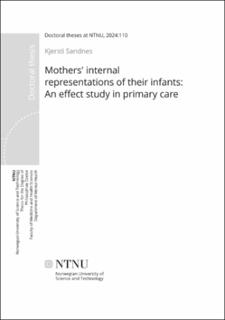| dc.contributor.advisor | Berg-Nielsen, Turid Suzanne | |
| dc.contributor.advisor | Kårstad, Silja Berg | |
| dc.contributor.advisor | Lydersen, Stian | |
| dc.contributor.author | Sandnes, Kjersti | |
| dc.date.accessioned | 2024-04-05T14:06:13Z | |
| dc.date.available | 2024-04-05T14:06:13Z | |
| dc.date.issued | 2024 | |
| dc.identifier.isbn | 978-82-326-7813-6 | |
| dc.identifier.issn | 2703-8084 | |
| dc.identifier.uri | https://hdl.handle.net/11250/3125140 | |
| dc.description.abstract | Parents develop thoughts, feelings, and ideas—or representations—of their infant. These representations include expectations and experiences of the infant’s temperament and needs, but also of the parents’ relationship with their infant and of themselves as caregivers. Such representations can reflect balanced perceptions of the infant and the caregiving role, with a high degree of acceptance, flexibility, sensitivity, openness, and joy. Parents’ representations may also be disengaged, general, and rejecting of the infant’s personality and needs, or distorted, confused, and anxiously overwhelmed by the child’s needs and their caregiver responsibilities. Parental representations are formed during pregnancy and guide the parents’ subsequent caregiving and the attachment quality developed by the infant to the parents. Thus, early identification of dysfunctional parent representations holds the promise of increasing the efficacy of both preventive and treatment efforts early in a child’s life.
The overall aim of this thesis was to investigate the effect of a community-based, lowthreshold video-feedback parenting intervention on mothers’ representations of their infants compared to treatment as usual. We used data from a randomized controlled trial (RCT) that was conducted between 2008 and 2014 in eight Norwegian municipalities or urban districts. The participants were 152 predominantly first-time mothers and their infants (newborn to two years of age). Most of the families were recruited from the local Well Baby Centers. All participants received the conventional, universal care at the Well Baby Centers, which was the treatment at usual condition. Additionally, half of the mothers received the Videofeedback of Infant Parent Interaction intervention (VIPI), which is a manualized parenting intervention based on the Marte Meo method.
First, we investigated the psychometric properties of a much-used instrument designed to elicit parents’ representations of the child—the Working Model of the Child Interview (WMCI). We then studied whether VIPI could improve negative features of the mothers’ representations of their infants beyond possible changes due to the conventional care at community Well Baby Centers. Finally, we tested whether alterations of the mothers’ representations were related to improvements in the infant-parent interaction quality, which has been reported from a previous investigation. We used data from baseline assessments and 6-months follow-up after the VIPI intervention ended.
The results showed that the WMCI is a valid tool for use in research and clinical practice with a low-to-moderate-risk sample of mothers with infants. The mothers’ representations were independent of the child’s gender, the mothers’ age, the mothers’ level of education, or where the family lived. Both the mothers who received treatment as usual and the mothers who additionally received VIPI improved some negative features of their representations. They became less anxious, less irrationally fearful of the child’s health and safety, and perceived the infant as less difficult to care for. Additionally, the mothers’ representations became slightly less sensitive as the child grew older, most likely because it is difficult to remain sensitive to a toddler’s autonomy demands than to the dependency of an infant. We did not find any relation between improvements of the representations and improved infant-mother interaction quality.
In summary, the results from this study indicate that the supportive services at the Well Baby Centers had a positive effect on aspects of the mothers’ representations of their infants. The sample comprised of predominantly first-time mothers; thus, these seem to benefit the most from these services. Interventions aiming to improve the mother-infant relationship should address both maternal representations and the infant-mother interaction, and evaluations of both domains should be conducted. More research is needed to investigate core components of interventions that influence parents’ negative representations, and how changes of representations improve the parent-infant interaction quality. There is a particular need for examination of whether such core components can be incorporated in primary care services, as these are unique arenas for detecting early indications of negative parent-infant relationships in the general population and may thus prevent negative development for the child. | en_US |
| dc.language.iso | eng | en_US |
| dc.publisher | NTNU | en_US |
| dc.relation.ispartofseries | Doctoral theses at NTNU;2024:110 | |
| dc.relation.haspart | Paper 1: Sandnes, Kjersti; Lydersen, Stian; Berg Kårstad, Silja; Berg-Nielsen, Turid Suzanne. Measuring mothers' representations of their infants: Psychometric properties of the clinical scales of the working model of the child interview in a low- to moderate-risk sample. Infant Mental Health Journal 2021 ;Volum 42.(5) s. 690-704. Published by Wiley. This is an open access article under the terms of the Creative Commons Attribution License CC BY. Available at: http://dx.doi.org/10.1002/imhj.21934 | en_US |
| dc.relation.haspart | Paper 2: Sandnes, Kjersti; Berg-Nielsen, Turid Suzanne; Lydersen, Stian; Berg Kårstad, Silja. Can mothers' representations of their infants be improved in primary care? A randomized controlled trial of a parenting intervention using video feedback in a predominantly low- to moderate- risk sample. Frontiers in Psychiatry 2023 ;Volum 14. s. – Published by Frontiers media. This is an open-access article distributed under the terms of the Creative Commons Attribution License (CC BY). Available at: http://dx.doi.org/10.3389/fpsyt.2023.1232816 | en_US |
| dc.relation.haspart | Paper 3: Sandnes, Kjersti; Berg Kårstad, Silja; Lydersen, Stian; Berg-Nielsen, Turid Suzanne. Are changes in mothers’ representations of their infants related to changes in observed mother–infant interaction quality?. Infant Behavior and Development 2023 ;Volum 73. s. – Published by Elsevier. This is an open access article under the CC BY license. Available at: https://doi.org/10.1016/j.infbeh.2023.101896 | en_US |
| dc.title | Mothers' internal representations of their infants: An effect study in primary care | en_US |
| dc.type | Doctoral thesis | en_US |
| dc.subject.nsi | VDP::Medisinske Fag: 700 | en_US |
